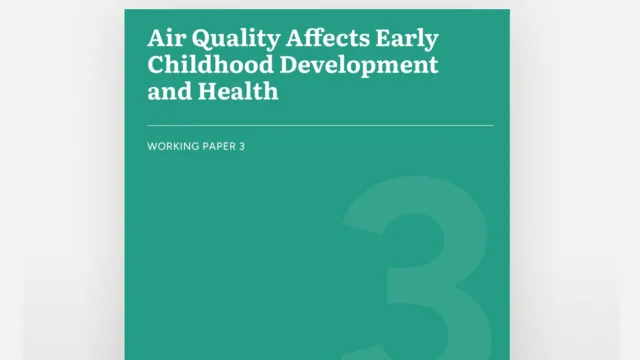Air Quality Affects Early Childhood Development and Health
This working paper explores the many ways air quality impacts the health and well-being of children and offers solutions for improving indoor air quality.

The influences in a child’s developmental environment, both positive and negative, interact to shape the development of their brain, the integrated systems in their body—including the immune, metabolic, and cardiovascular systems—and even how their genes are expressed. Clean air is an essential part of a healthy developmental environment, and ensuring that children and their caregivers have clean air to breathe in all the spaces where they spend time—both indoors and out—is key to supporting long-term health and well-being.
Actionable solutions to improve air quality range from better policies and pollutant-free products to healthier housing, ventilation, and building materials. Yet, these solutions have not been widely adopted, and air pollution continues to disproportionately affect families with fewer resources and families of color due to systemic inequalities in housing and zoning. By addressing these disparities, we can support those most impacted and ensure all children have cleaner air to breathe.
This working paper from the Early Childhood Scientific Council on Equity and the Environment explores how air quality—with a focus on indoor air, given that we typically spend more than 90% of our time inside—affects children’s health and well-being. The working paper offers specific solutions and resources for taking action in your community, as well as preventative strategies that address the root causes of poor indoor air quality.
Sections include:
- Air Pollution Affects Us All
- Indoor Air Pollution Has Especially Powerful Effects on Babies and Young Children
- How Indoor Air Quality Affects Fetal and Child Development
- What Pollutes Indoor Air
- Air Pollution Does Not Act Alone
- Effective Strategies to Advance Fairness in Air Quality Can Create a Multiplier Effect
Suggested citation: Early Childhood Scientific Council on Equity and the Environment (2025). Air Quality Affects Early Childhood Development and Health: Working Paper No. 3. Retrieved from www.developingchild.harvard.edu